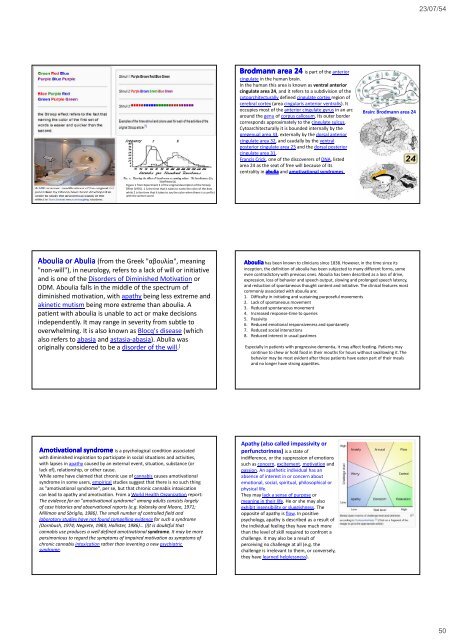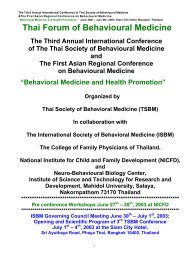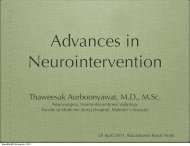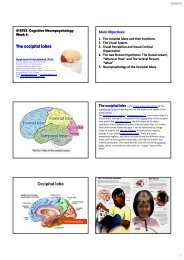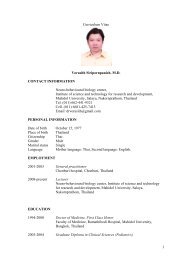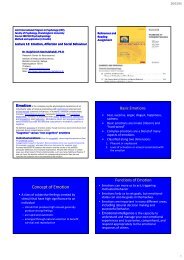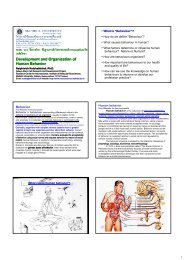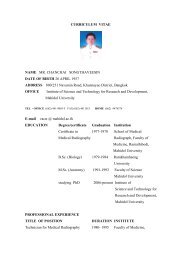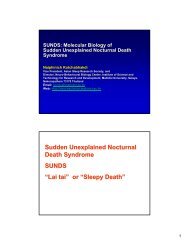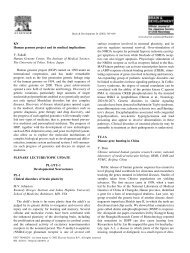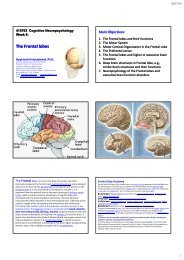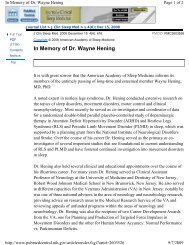Neurological Examination, clinical cases and neuropsychological ...
Neurological Examination, clinical cases and neuropsychological ...
Neurological Examination, clinical cases and neuropsychological ...
You also want an ePaper? Increase the reach of your titles
YUMPU automatically turns print PDFs into web optimized ePapers that Google loves.
23/07/54<br />
Brodmann area 24 is part of the anterior<br />
cingulate in the human brain.<br />
In the human this area is known as ventral anterior<br />
cingulate area 24, <strong>and</strong> it refers to a subdivision of the<br />
cytoarchitecturally defined cingulate cortex region of<br />
cerebral cortex (area cingularis anterior ventralis). It<br />
occupies most of the anterior cingulate gyrus in an arc<br />
around the genu of corpus callosum. Its outer border<br />
corresponds approximately to the cingulate sulcus.<br />
Cytoarchitecturally it is bounded internally by the<br />
pregenual area 33, externally by the dorsal anterior<br />
cingulate area 32, <strong>and</strong> caudally by the ventral<br />
posterior cingulate area 23 <strong>and</strong> the dorsal posterior<br />
cingulate area 31.<br />
Francis Crick, one of the discoverers of DNA, listed<br />
area 24 as the seat of free will because of its<br />
centrality in abulia <strong>and</strong> amotivational syndromes.<br />
Brain: Brodmann area 24<br />
Figure 1 from Experiment 2 of the original description of the Stroop<br />
Effect (1935). 1 is the time that it takes to name the color of the dots<br />
while 2 is the time that it takes to say the color when there is a conflict<br />
with the written word<br />
Aboulia or Abulia (from the Greek "αβουλία", meaning<br />
"non‐will"), in neurology, refers to a lack of will or initiative<br />
<strong>and</strong> is one of the Disorders of Diminished Motivation or<br />
DDM. Aboulia falls in the middle of the spectrum of<br />
diminished motivation, with apathy being less extreme <strong>and</strong><br />
akinetic mutism being more extreme than aboulia. A<br />
patient with aboulia is unable to act or make decisions<br />
independently. d It may range in severity from subtle bl to<br />
overwhelming. It is also known as Blocq's disease (which<br />
also refers to abasia <strong>and</strong> astasia‐abasia). Abulia was<br />
originally considered to be a disorder of the will. [<br />
Aboulia has been known to clinicians since 1838. However, in the time since its<br />
inception, the definition of aboulia has been subjected to many different forms, some<br />
even contradictory with previous ones. Aboulia has been described as a loss of drive,<br />
expression, loss of behavior <strong>and</strong> speech output, slowing <strong>and</strong> prolonged speech latency,<br />
<strong>and</strong> reduction of spontaneous thought content <strong>and</strong> initiative. The <strong>clinical</strong> features most<br />
commonly associated with aboulia are:<br />
1. Difficulty in initiating <strong>and</strong> sustaining purposeful movements<br />
2. Lack of spontaneous movement<br />
3. Reduced spontaneous movement<br />
4. Increased response‐time to queries<br />
5. Passivity<br />
6. Reduced emotional responsiveness <strong>and</strong> spontaneity<br />
7. Reduced social interactions<br />
8. Reduced interest in usual pastimes<br />
Especially in patients with progressive dementia, it may affect feeding. Patients may<br />
continue to chew or hold food in their mouths for hours without swallowing it. The<br />
behavior may be most evident after these patients have eaten part of their meals<br />
<strong>and</strong> no longer have strong appetites.<br />
Amotivational syndrome is a psychological condition associated<br />
with diminished inspiration to participate in social situations <strong>and</strong> activities,<br />
with lapses in apathy caused by an external event, situation, substance (or<br />
lack of), relationship, or other cause.<br />
While some have claimed that chronic use of cannabis causes amotivational<br />
syndrome in some users, empirical studies suggest that there is no such thing<br />
as "amotivational syndrome", per se, but that chronic cannabis intoxication<br />
can lead to apathy <strong>and</strong> amotivation. From a World Health Organization report:<br />
The evidence for an "amotivational syndrome" among adults consists largely<br />
of case histories i <strong>and</strong> observational reports (e.g. Kl Kolansky<strong>and</strong> Moore, 1971;<br />
Millman <strong>and</strong> Sbriglio, 1986). The small number of controlled field <strong>and</strong><br />
laboratory studies have not found compelling evidence for such a syndrome<br />
(Dornbush, 1974; Negrete, 1983; Hollister, 1986)... (I)t is doubtful that<br />
cannabis use produces a well defined amotivational syndrome. It may be more<br />
parsimonious to regard the symptoms of impaired motivation as symptoms of<br />
chronic cannabis intoxication rather than inventing a new psychiatric<br />
syndrome.<br />
Apathy (also called impassivity or<br />
perfunctoriness) is a state of<br />
indifference, or the suppression of emotions<br />
such as concern, excitement, motivation <strong>and</strong><br />
passion. An apathetic individual has an<br />
absence of interest in or concern about<br />
emotional, social, spiritual, philosophical or<br />
physical life.<br />
They may lack a sense of purpose or<br />
meaning in their life. He or she may also<br />
exhibit hb insensibility bl or sluggishness. The<br />
opposite of apathy is flow. In positive<br />
psychology, apathy is described as a result of<br />
the individual feeling they have much more<br />
than the level of skill required to confront a<br />
challenge. It may also be a result of<br />
perceiving no challenge at all (e.g. the<br />
challenge is irrelevant to them, or conversely,<br />
they have learned helplessness).<br />
50


